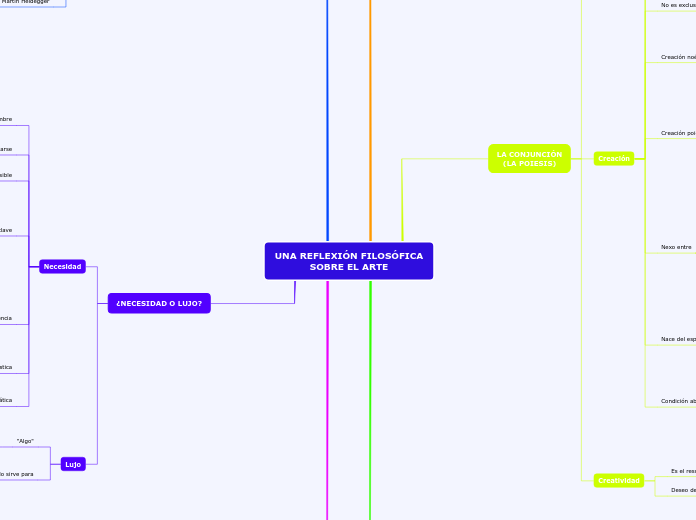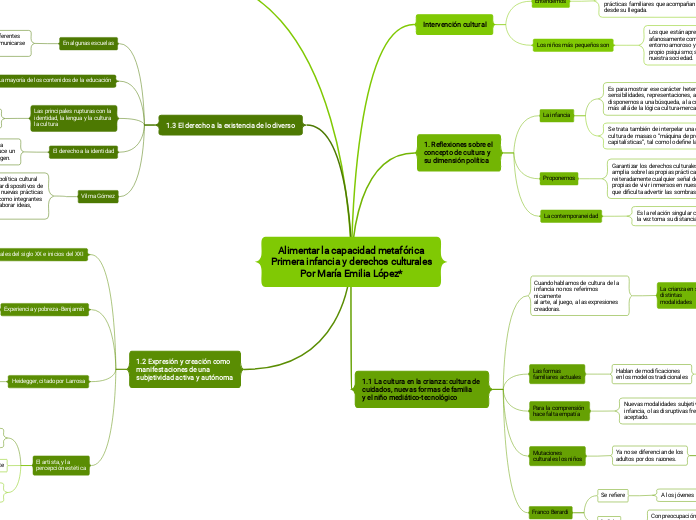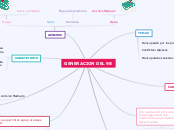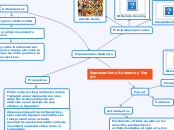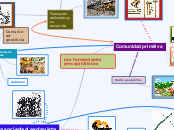UNA REFLEXIÓN FILOSÓFICA
SOBRE EL ARTE
In linguistics, syntax is the set of rules, principles, and processes that govern the structure of sentences in a given language, usually including word order.
LA SUBJETIVIDAD
(EL ARTISTA)
Intuición
La dimensión del trabajo
Capacidad de
Expresar
Percibir
Captar
Subjetividad especial
La necesidad interior
Fenómeno ontológico
Indica cómo ha de actuar
Empuja a realizar la obra
"Sein und Zeit"
La voz interior
La voz de la conciencia
La inspiración
Estado de creación
Capacidad creadora
Debe alcanzar
Se encuentra determinado por su contexto histórico
Se nutre del mundo exterior
Refleja el espíritu de su época
Inconscientemente
Conscientemente
Indirectamente
Directamente
Genio
Característica absoluta
Pensamientos
"La producción artística se convierte así en un
estado al que se da el nombre de inspiración"
¿NECESIDAD O LUJO?
A compound sentence is a sentence that has at least two independent clauses joined by a comma, semicolon or conjunction. An independent clause is a clause that has a subject and verb and forms a complete thought.
Lujo
Create your own compound sentences, using the coordinators above.
Solo sirve para
Agradar más
La vida
"Algo"
Superfluo
Necesidad
When independent clauses are joined with coordinators (also called coordinating conjunctions), commas and semicolons, they do more than just join the clauses. They add meaning and flow to your writing.
Prática
Permite conocer
De creación artística
Que valen por sí mismas
Dimensión de trascendencia
Musical
Artística
Arquitectónica
Literaria
Interrogantes clave
¿Qué sería de Inglaterra sin Shakespeare?
¿Qué sería de Grecia sin Homero?
¿Sería Italia, Italia sin Dante?
¿Qué sería el hombre sin el arte?
¿Sería España la misma sin El Quijote
"Algo" sin lo cual otro "algo" no sería posible
Fuerza que obliga al hombre a expresarse
Interiormente
Exteriormente
El arte pertenece a la esencia del hombre
Le ilustra la realidad
¿QUÉ ES EL ARTE?
A complex sentence is a sentence that contains an independent clause and one or more dependent clauses.
An independent clause can stand alone as a sentence, but a dependent clause even though it has a subject and a verb cannot stand alone.
Filósofos
The subject clause is a dependent clause that acts as a subject.
Martin Heidegger
Subtopic
"La esencia del arte sería, pues, ésta:
el ponerse en operación la verdad del ente"
Producción filosófica
Sentido del ser
Estética
Alemán
Friedrich Hegel
Afirma que
El arte es expresión sensible de la idea
"La tarea del arte consiste en hacer que la idea sea
accesible a nuestra contemplación bajo una forma sensible"
"El arte es una forma particular
bajo la cual el espíritu se manifiesta"
Penetra la espiritualidad de la realidad
Gran lucidez
Idealismo alemán
Elementos
A predicative clause may be introduced by conjunctions - that, whether, whether... or, as, as if, as though, because, lest, the way - or connectives.
The latter may be conjunctive pronouns - who, whoever, what, whatever, which - or conjunctive adverbs - where, wherever, when, whenever, how, why.
Resultado
La obra de arte
Conjunción entre ambas
La creación
Dimensión objetiva
Dimensión subjetiva
El artista
Definiciones típicas
An appositive clause follows another noun or noun phrase in apposition to it; that is, it provides information that further identifies or defines it.
Actividad humana
Elabora experiencia estética
Causa un choque
Crea formas
Produce belleza
Representa la realidad
Una actividad humana
The object clause is a phrase on which a verb performs an action. It falls at the end of a sentence, and is governed by a verb or a preposition.
No puede ser encerrado en una definición
No puede abarcarse de forma global
Inapresable
La realidad
Por medio de
Estructura
Catedral
Lienzo
Espiritual
Física
Esencial
Es un concepto que no varía con el tiempo
Manifiesta la verdad
Situándonos en la plenitud
EL RESULTADO
(LA OBRA DE ARTE)
Postura del artista
Capaz de mostrar lo auténticamente decisivo de lo real
Crea
Descubre
Expresa al ser en plenitud
Recoge la esencia más íntima de la realidad
Deja sin palabras
Producto
Expresa
Un aspecto de la condición de ser humano
La comunicación de belleza a través de las almas
La creación de nuevos mundos
La expresión del todo
El desecamiento del mundo
El ser en plenitud
Lo inmaterial de la realidad
La totalidad del artista
Muestra la realidad más plena
Es lo que queda
Se obtiene al final del proceso
LA CONJUNCIÓN
(LA POIESIS)
Creatividad
See the example below and try to create your own simple sentences.
Tim is driving the red car.
Deseo de infinitud de un ser finito
Es el resultado de la perfección misma o de su deseo
Creación
See the example below and try to create your own simple sentences.
Tim is the driver.
Condición abismática del hombre
Anhelo de perfección
Infinitud
Libertad
Abismo
Nace del espíritu
Se da de forma inesperada
Nexo entre
Verdad
Naturaleza
Alma
Exterior
Interior
Objetividad
Subjetividad
Creación poiética
Perspectiva artística
Desvela lo bello
Expresa contenidos artísticos
Creación noética
Perspectiva científica
Búsqueda de la verdad
Pensamientos de costosas investigaciones
Expresa resultados en contenidos noemáticos
No es exclusivo del arte
Experiencia primaria
Es el arte del
conocimiento
Aprobación del concepto
Renacimiento
Artista
Individual
Creativo
Libre
Independiente
Dimensión Intermedia
See the example below and try to create your own simple sentences.
Tim drives the car.
Mundo
Hombre
LA OBJETIVIDAD
(LA REALIDAD)
Conclusión
An adverbial is an individual word (that is, an adverb), a phrase, or a clause that can modify a verb, an adjective, or a complete sentence.
Da al artista los materiales para crear
Objetiviza al sujeto
Personaliza la realidad
Obra
The attribute is defined as a quality or characteristic of a person, place or thing.
Se divide en
Obra maestra
Ejemplos
"Los Girasoles"
Van Gogh
"La Gioconda"
Leonardo da Vinci
Motivada por su expresión y captación de lo real
Consta de una serie de elementos constitutivos propios
Supera en demasía el conjunto de obras en general
Obra de arte
Se ajusta a los cánones de determinado arte
De cualquier creador poiético
Es "eso"
The predicative is defined as an adjective or noun forming or contained in the predicate.
Its main trait is that it serves to express a property that is assigned to a 'subject'.
For e.g.: The dog is old.
Reside en la presencia de lo real
La proximidad con el ser
No depende de una subjetividad para ser
Es donde reside la "sustancia"
Es objetiva
Que llena al artista
Inspiración
Fuente de donde bebe el arista
Sentimientos
Experiencias
Conocimientos
Una condición previa a la expresión
Arte
Traditional grammar defines the object in a sentence as the entity that is acted upon by the subject.
Se trata de la realidad
The indirect object identifies the person/thing for whom/which the action of the verb is performed.
The indirect object is usually a person or a thing.
No se trata principalmente de la belleza
The direct object is the receiver of the action mentioned in the sentence.
Belleza
The predicate of a sentence is the part that modifies the subject in some way. Because the subject is the person, place, or thing that a sentence is about, the predicate must contain a verb explaining what the subject does and can also include a modifier.
Añadido a la obra
Secundario
Problemáticas
The subject of a sentence is the person, place, thing, or idea that is doing or being something. You can find the subject of a sentence if you can find the verb.
Ask the question, 'Who or what 'verbs' or 'verbed'?' and the answer to that question is the subject.
El arte como algo
De voluntad libre
Objetivo
Captación de
La belleza
